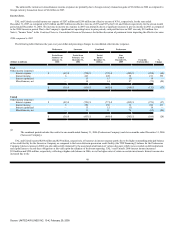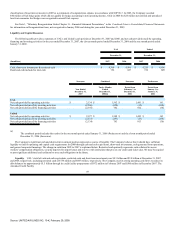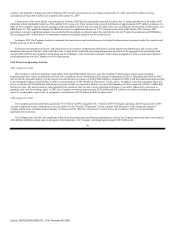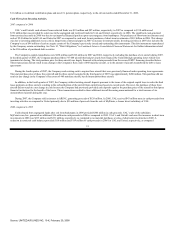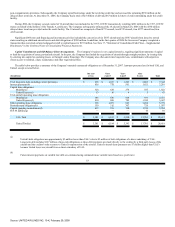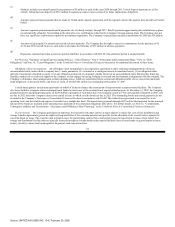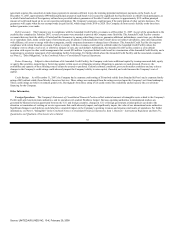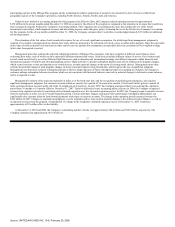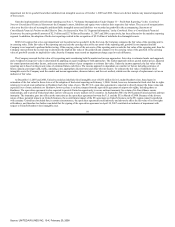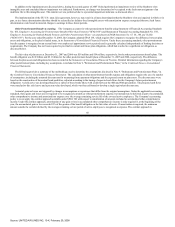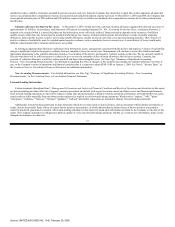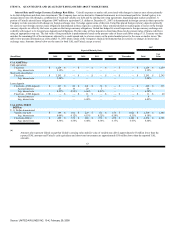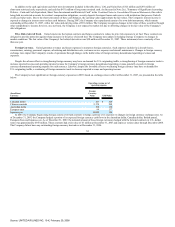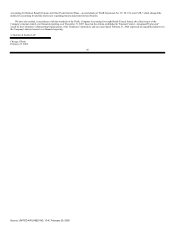United Airlines 2007 Annual Report Download - page 57
Download and view the complete annual report
Please find page 57 of the 2007 United Airlines annual report below. You can navigate through the pages in the report by either clicking on the pages listed below, or by using the keyword search tool below to find specific information within the annual report.
Risk for further information on the Company's foreign currency risks associated with its foreign operations.
Critical Accounting Policies
Critical accounting policies are defined as those that are affected by significant judgments and uncertainties which potentially could result in materially
different accounting under different assumptions and conditions. The Company has prepared the accompanying financial statements in conformity with GAAP,
which requires management to make estimates and assumptions that affect the reported amounts in the financial statements and accompanying notes. Actual
results could differ from those estimates under different assumptions or conditions. The Company has identified the following critical accounting policies that
impact the preparation of these financial statements.
Passenger Revenue Recognition. The value of unused passenger tickets and miscellaneous charge orders ("MCO's") is included in current liabilities as
advance ticket sales. United records passenger ticket sales and tickets sold by other airlines for use on United as operating revenues when the transportation is
provided or when the ticket expires. Tickets sold by other airlines are recorded at the estimated values to be billed to the other airlines. Non-refundable tickets
generally expire on the date of the intended flight, unless the date is extended by notification from the customer on or before the intended flight date. Fees
charged in association with changes or extensions to non-refundable tickets are recorded as passenger revenue at the time the fee is incurred. Change fees related
to non-refundable tickets are considered a separate transaction from the air transportation because they represent a charge for the Company's additional service to
modify a previous reservation. Therefore, the pricing of the change fee and the initial customer reservation are separately determined and represent distinct
earnings processes. Refundable tickets expire after one year. MCO's can be either exchanged for a passenger ticket or refunded after issuance. United records an
estimate of tickets that have been used, but not recorded as revenue due to system processing errors, as revenue in the month of sale based on historical results.
United also records an estimate of MCO's that will not be exchanged or refunded as revenue ratably over the validity period based on historical results. Due to
complex industry pricing structures, refund and exchange policies, and interline agreements with other airlines, certain amounts are recognized as revenue using
estimates both as to the timing of recognition and the amount of revenue to be recognized. These estimates are based on the evaluation of actual historical results.
Frequent Flyer Accounting. In accordance with fresh-start reporting, the Company revalued its frequent flyer obligation to estimated fair value at the
Effective Date, which resulted in a $2.4 billion increase to the frequent flyer obligation. The Successor Company elected to change its accounting policy for its
Mileage Plus frequent flyer program to a deferred revenue model. The Company believes that accounting for frequent flyer miles using a deferred revenue model
is preferable, as it establishes a consistent valuation methodology for both miles earned by frequent flyers and miles sold to non-airline business partners.
Before the Effective Date, the Predecessor Company used the historical industry practice of accounting for frequent flyer miles earned on United flights on
an incremental cost basis as an accrued liability and as advertising expense, while miles sold to non-airline business partners were accounted for on a deferred
revenue basis. As of the Effective Date, the deferred revenue value of all frequent flyer miles are measured using equivalent ticket fair value as described below,
and all associated adjustments are made to passenger revenues.
The deferred revenue measurement method used to record fair value of the frequent flyer obligation on and after the Effective Date was to allocate an
equivalent weighted-average ticket value to each outstanding mile, based upon projected redemption patterns for available award choices when such miles are
consumed. Such value was estimated assuming redemptions on both United and other
56
Source: UNITED AIR LINES INC, 10-K, February 29, 2008




